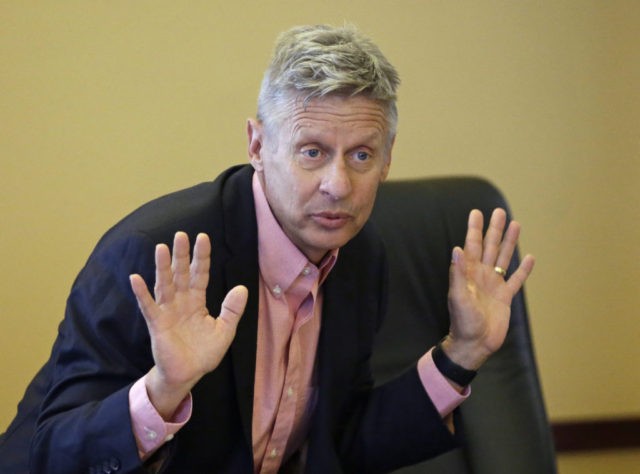SALT LAKE CITY (AP) — He has virtually no money, no strategy to compete in battleground states and no plan to stop talking about his drug use.
Yet with the Republican Party facing the prospect of a Donald Trump presidency, Libertarian presidential hopeful Gary Johnson could be a factor in 2016. The former two-term New Mexico governor, a Republican businessman perhaps best known for his years-long push to legalize marijuana, has a sobering message for a “never-Trump” movement desperately seeking a viable alternative.
“I will be the only third-party candidate on the ballot in all 50 states,” Johnson says. “I’m it.”
He is not their top choice, and he must first clinch the Libertarian nomination at this weekend’s national convention, but the quirky White House hopeful may be the GOP’s best, last chance to stop a New York billionaire some fear is destroying the soul of their party.
The Trump haters have struggled to convince other third-party prospects to join the presidential contest. They’ve courted the likes of 2012 GOP nominee Mitt Romney, Oklahoma Sen. Tom Coburn, Nebraska Sen. Ben Sasse and retired Marine Corps General James Mattis to no avail.
And with ballot access deadlines already starting to pass, some say Johnson is beginning to look like the most legitimate alternative, even if he earned just 1 percent of the national vote in the last presidential contest.
He strengthened his position this week by adding running mate William Weld, a well-respected former Massachusetts governor who raised tens of thousands of dollars for Romney’s presidential runs. They represent one of the strongest Libertarian tickets in memory, although would-be supporters are not yet sold.
“To be clear, the reports of the death of the non-Libertarian third-party effort are greatly exaggerated. I understand there are still plenty of irons in the fire,” said conservative columnist Quin Hillyer, who has vowed not to support Trump this fall.
“Never Trump means never Trump,” Hillyer added. “At the very least it’ll be Gary Johnson on the Libertarian ticket.”
Johnson’s longshot campaign is based in Salt Lake City, home to his most trusted political adviser and in a state where Trump finished a distant third place in March’s Republican primary election. The local presence of Johnson’s headquarters was a surprise to many Utah state legislators who met with the Libertarian candidate inside the state house last week.
A handful of lawmakers in both parties were receptive.
“Utah understands how dangerous Trump is,” said Howard Stephenson, a Republican state senator who had warm words for Johnson. “We’re looking for someone to vote for.”
Johnson’s political strategy is simple.
With just $35,000 in his campaign coffers at the end of March, he doesn’t have the money for TV ads, poll-tested messaging, or a paid presence in battleground states where Trump and likely Democratic nominee Hillary Clinton are already beginning to invest resources.
Johnson is instead relying on an intensifying schedule of media appearances to boost his name recognition in an effort to reach the necessary 15 percent threshold to qualify for the presidential debates this fall.
“We cannot go into a battleground state and compete,” said Johnson’s senior strategist Ron Nielson, citing the high cost of running a campaign in states like Florida or Ohio.
The Johnson campaign will instead focus its resources on cheaper states where libertarians have done well in the past, places like Alaska, maybe New Hampshire, he says.
Yet Trump’s Republican critics don’t necessarily need to find a candidate who can win. Many are seeking a legitimate protest candidate where they could focus their anti-Trump energy. Should that candidate earn even a few percentage points in key states this fall, it could hurt Trump’s chances.
“Gary will be an outlet for millions of Americans who just can’t fathom the idea of voting for Hillary Clinton or Donald Trump,” said Ed Crane, who co-founded the libertarian-leaning Cato Institute and now runs a super PAC he says may support Johnson “down the road.”
It’s no guarantee, however, that Johnson will earn the Libertarian presidential nomination. He must first beat back aggressive challenges at the party’s national convention in Orlando this weekend.
Johnson represents a set of policies that do not line up perfectly with Republicans or Libertarians.
He embraces fiscal conservatism, but not to the lengths that some hardline anti-government libertarians would like. He considers himself a liberal on social issues, supporting same-sex marriage and abortion rights. And he supports a non-interventionalist foreign policy that focuses on America’s challenges at home.
Many know him best for his repeated calls to legalize drugs.
Johnson largely focuses his energy on marijuana, but also suggests that concern over narcotics such as heroin are exaggerated compared to the impact of alcohol or even smoking cigarettes. He is a regular marijuana user, noting that he most recently took an edible form of the drug three weeks ago.
“I’m one of the 100 million Americans that do this. If that disqualifies me from being president, so be it,” he told The Associated Press, adding that he recently purchased the drug legally in Colorado but illegally transported it back to his home in New Mexico.
“Sure, I’m in the tens of thousands of those that are guilty of that phenomenon,” he says.
He promises not consume marijuana if elected president, however.
“I think the American people deserve to know that there will be a steady hand,” he said. “And I would hope that my history regarding this stuff would bear out the fact that I’m a pretty disciplined cat.”

COMMENTS
Please let us know if you're having issues with commenting.